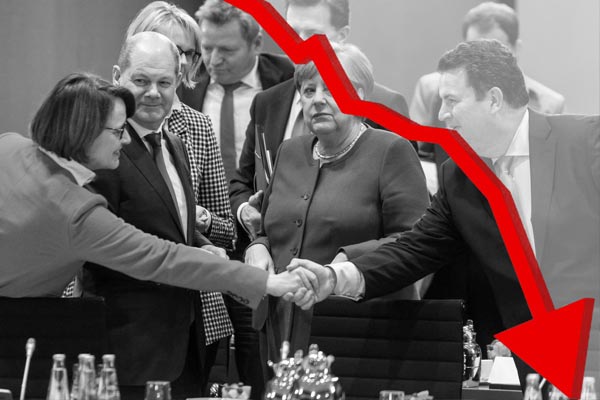Get the right out of parliament! Together for the interests of workers and the poor!
This year's national elections illustrate a historic upheaval: for the first time in the history of the Federal Republic, it seems likely that the two major popular parties - which between 1953 and the early 2000s together never won less than 70% in elections - could fall below the 50% mark.
This puts the SPD and CDU at an all-time low. It is the result of alienation from the perennial neoliberal policies of the major bourgeois parties, which have undermined social concessions to sections of the middle class and better-off working class for many years, and driven social polarisation.
As a result, we are witnessing an acceleration of political upheavals, as well as increasing instability in party politics. The political left must respond these events with a militant course in the neighbourhoods and workplaces, or it will leave the playing field to the employers and the social demagogy of the right.
Crisis of capitalism
Behind all these events is the deep crisis of capitalism. Economic reports have impressively shown in recent weeks that productivity growth in the EU countries has been hovering around zero since the 2008 crisis. And although the DAX climbed to an absolute record high of over 15,700 points on 4 June, the car industry alone is threatened with job cuts in the six-digit range and expansion investments in medium-sized companies are stagnating.
Since there is hardly real growth, wage reductions and social cuts are being enforced to enable profits and dividends. This policy - neoliberalism - is a consequence of the crises of the 1970s and 1980s, and cannot simply be reversed at will within the framework of capitalism.
In addition, there are gloomy prospects for German economy. The overproduction crisis in the global car and steel industries is putting German manufacturers under pressure. Progressive tendencies towards deindustrialisation and the break-up and dismemberment of large corporations like ThyssenKrupp will further cloud the prospects of the German economy. And the chip crisis, which was triggered by the fact that production in capitalism has been internationalised to the highest degree, but at the same time is not planned sensibly but left to the anarchy of the market, has also highlighted the vulnerability of German economy. This capitalism leaves the ruling capitalist parties no room for substantial social reforms.
Discontent with the politics of national unity: Greens strengthened, SPD weakened
At present, it is the Greens who are benefiting most from the low polls of SPD (social democracy) and CDU (conservatives). Precisely because the SPD's voter potential has been plummeting for years and DIE LINKE has stagnated at 6-7%, voters disappointed by the Grand Coalition are turning to the Greens.
There are more than enough of them. The current poll figures of the former 40%-party SPD are the bill for decades of empty promises and cutback policies. Hartz IV, Riester, 100,000 endangered jobs in the car industry, millions of short-time workers in 2020, rescue packages worth billions to large corporations and 20 clinic closures last year alone, plus 34 clinics threatened with closure: All this is due to the SPD in government.
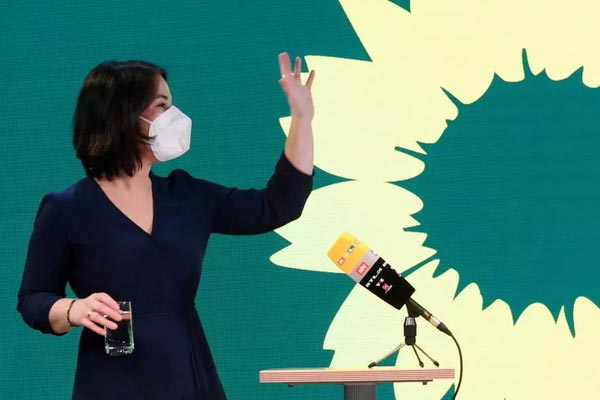
Many who are disappointed with social democracy and want change now see the Greens as an alternative to the "business as usual" of the Grand Coalition. In numbers, this has meant that they gained 760,000 votes from the SPD in the 2017 federal election; 1,500,000 in the 2019 European election (they also gained 1,240,000 votes from the CDU at the time). But the current trend goes further. In current polls, the Greens are consistently at 20-25% - more than doubling compared to the last federal election.
The Greens are aware that they want to win over disappointed SPD and to some extent even Left Party voters, and to broaden their base - which a few years ago, together with the Liberals, had the highest income of all - also in poorer and working class layers.
They feel the pressure that there is no consent in these groups for "ecological" policies that make life ever more expensive for workers and poor and drive deindustrialisation.
Thus, after her election as candidate for chancellor at the Green Party conference, Annalena Baerbock simultaneously addressed the employers to whom she proposed a "pact [of the Greens] with German industry", but also spoke of the "appreciation of our country" built on the "hard work of coal miners and their families" and that an "ecological transformation" could create up to 800,000 jobs.
Employers' agitation - but green capitalism is no way out!
The business lobby also sees the Greens gain as a vote of no confidence in the two big parties of the German bourgeoisie. The Initiative Soziale Marktwirtschaft (INSM) (English: “Initiative for social market economy”, influential lobby group of German employers) therefore launched its own smear campaign against Annalena Baerbock in several major newspapers, which should make one thing particularly clear: The course of social cuts, tax giveaways for the rich, deregulation of labour and a rejection of the rent cap is non-negotiable.
They use the agitation against Baerbock to launch an all-out attack against the rights of workers, poor and social movements. CETA should be ratified, taxes for high earners kept low, the retirement age raised, wage levels depressed and the "freedom of the economy" guaranteed. The party donation of media mogul Georg Kofler, who supported the Liberals with 750,000 euros to prevent the "antiquated planned economy socialism" of the Greens, is similar.
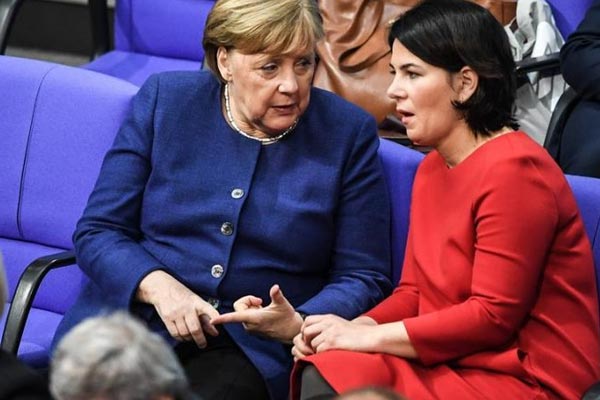
But also the Greens were in the bourgeois newspapers with record donations: 1.67 million euros from four rich donors alone; including a million from Moritz Schmidt, who, among other things, made his fortune from bitcoin speculations, 500,000 from a giant in the private pharmaceutical industry and a total of 120,000 from a major heir to a Swabian plastic packaging company. Would they all dig so deep into their pockets, if the Greens were expected to expropriate the companies, or even just abolish plastic packaging? Certainly not. Like that, the Greens once again prove how little we have to expect from the "green capitalism" they offer to workers and poor.
Elections in Saxony-Anhalt – get the right out of parliament!
It also got clear from the tone in which the elections in Saxony-Anhalt were commented on, that class conflict is intensifying. The Federal Government Commissioner for the East, Marco Wanderwitz (CDU), used the moment to blow the horn of anti-communism: 20.8% for the AfD, Wanderwitz said, was the result of a "dictatorship-socialised" population - with a party that was the strongest force ever among those under 30, who had never even experienced life in the GDR!
The detached language of bourgeois politics will do nothing to dissuade demoralised strata from supporting the AfD. Through social cuts and their ugly arrogance, they will continue to fuel social de-structuring and provide the AfD with a breeding ground for their demagogy.
The Greens as well are unable to counter this: While Habeck talked about the fact that "processes of change are objectively necessary" (with which he means taxing CO2 and cutting jobs) and that "all parties have decided on these figures", the far-right candidate of the AfD Chrupalla cornered him for the social attacks in the guise of "ecological transformation", without Habeck being able to provide credible answers on how to avert them.
The AfD's appearance is pure demagogy: its "Special Economic Zone East" is a demand for a tax haven in East Germany for corporations "on the same level as in neighbouring Poland". Chrupalla, who belongs to the ultra-right wing of Björn Höcke, also does not primarily address ordinary workers, but the prejudices of the declassed middle class elements, of "middle classes and crafts".
These anti-working class tendencies also speak from Meuthen's attacks against the Greens, whose severely limited reformist programme he attacks for being "eco-socialist". How is such a party, which already discovers socialism in a limited programme for minimum wages, against pension cuts and for minimal reforms in the housing market, supposed to improve the situation of the working class?
Change of course necessary: DIE LINKE must learn from the mistakes of the new reformism!
Social contradictions are the driving force of the shifts in political forces - and only on this front line can the struggle against the attacks of the employers and the AfD be won! It is only the political left that can base itself on the struggles of the working class and push forward the struggle in the neighbourhoods and workplaces. This will have a positive impact on their election results, but above all - and this is much more important! - lay a basis for a struggle to improve the living conditions of workers and poor. Because, following Rosa Luxemburg, the power of the political left lies not in the number of its parliamentary mandates, but in the number of its supporters among the population and its strength on the streets.
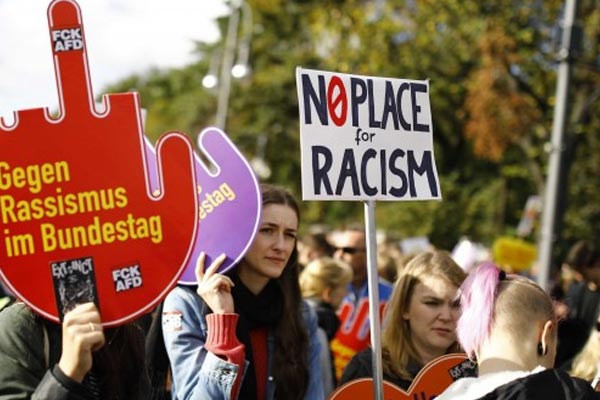
In this sense, the election in Saxony-Anhalt is a warning to DIE LINKE. The views of the voter base of CDU and AfD document the deep polarisation in this election. Among the AfD electorate, 91% agreed that the CDU should form a coalition with the AfD - at the same time, among CDU voters, only 11% did. Thus, a considerable proportion of CDU voters also aimed to prevent a government with AfD participation. But as we know, the politics of the CDU - which itself nominated the right-wing radical Maaßen as its direct candidate for the Bundestag election - is completely impotent in the fight against the right. But while even the CDU is staging itself as a force against the right, the decline of DIE LINKE in Saxony-Anhalt continues. The fact that less than 10% of the under-30s, including non-voters, voted for the Left Party proves that the party does not offer the East German youth a combative course against the ailing living conditions.
Also it is important to see, that the Greens have not always been the winner in the decline of social democracy. In the 2009 federal election - the first after the introduction of Hartz IV - DIE LINKE gained 1,100,000 votes from the SPD, more than any other party! At that time, the party was primarily perceived as a militant force against Hartz IV, social cuts and foreign assignments of the Bundeswehr.
But it is precisely the election in Saxony-Anhalt, where the contentless course of "economic expert" Wulf Gallert has now been replaced by the apolitical slogan "Better. DIE LINKE" has proved that a "government policy on hold" is only the right recipe for the party's stagnation.
Let's look at the experience in the Spanish state: Here, the left party Podemos for years has bowed to the course of Pedro Sánchez's social democracy in government, and has not gone against the neoliberal policies of Isabel Ayuso (Conservatives) in Madrid that alienated masses of workers and poor. On the contrary, the national government pursued a policy of mutual respect and non-interference. When Ayuso now took another swing to the right, pursuing open cooperation with the radical right-wing Vox in the Madrid regional elections, the best-known Podemos leader Pablo Iglesias resigned from his government posts to run against Ayuso in Madrid. The result: a resounding defeat, with 7.21% and just a 1.61% gain for Podemos, largely discredited in Madrid politics; at the same time 9.13% for Vox.
Strengthen the workers' movement!
It is a step forward that in the coming federal election the Grand Coalition will be voted out and the Greens will feel forced to include minor social reforms in their programme. But we must not be fobbed off with flimsy promises. We support the ecological transformation of factories if it is planned and in the interest of ordinary working people and poor. But the left party and the trade union left must attack the propaganda phrases of "ecological transformation" when it comes to de-industrialising whole regions; offering second-rate severance pay and poor retraining programmes.
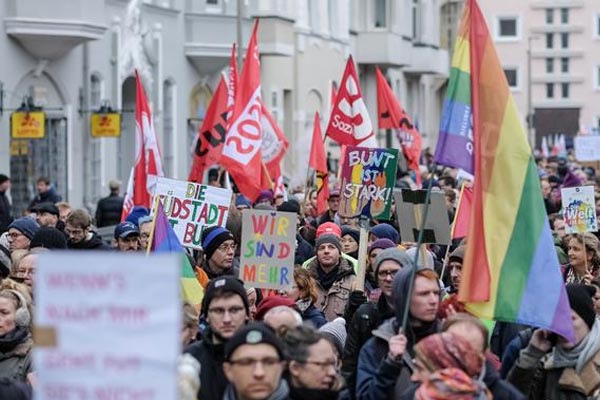
While Baerbock talks about the shift to sustainability being able to create hundreds of thousands of new jobs, we see hundreds of thousands of jobs being cut and wages lowered in the steel and car industries - despite increased investment in new technologies in the last years! Such policies will turn more regions of Germany into a Lausitz, destroy the future prospects of workers and their families, and widen the gap between prices and wages.
It is no use for the Left Party to pander to the SPD and the Greens in such a situation. The interests of ordinary workers and poor are more than clear: an end to capitalist health policy, an end to the cuddling of the trade unions with the bosses, yes to rent caps and the expropriation of housing and property giants, an end to "flexibilisation", outsourcing, privatisation, wage squeezes and job cuts.
Hardly anything decided by the government and the bosses in the past year has benefited working families. While short-time work was announced and jobs were cut in the same companies that received high sums out of the public rescue packages, private profiteers raked in billions in dividends on the stock exchange. The owner of Lidl alone has gained an average of 1 billion a month in wealth during the pandemic!
Trade unions and DIE LINKE must offer a militant politics that offers a struggle for a fundamental change on these fundamental problems. Instead of breaking up Thyssen and Co. for reindustrialisation, we demand an ecological transformation under control of the workers and along their interests, and production according to the needs of ordinary people. The profiteers on the stock exchange must be expropriated and their profits used to provide for the ordinary people and poor. Such a policy cannot be achieved with, but only in struggle against the capitalist establishment.






